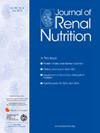Comparison Between Global Leadership Initiative on Malnutrition Criteria and Protein-Energy Wasting in Patients With Kidney Failure Undergoing Peritoneal Dialysis
IF 3.2
3区 医学
Q2 NUTRITION & DIETETICS
引用次数: 0
Abstract
Objective
Protein-energy wasting (PEW) is the chronic kidney disease-specific diagnosis encompassing malnutrition. PEW is associated with adverse outcomes, including those receiving peritoneal dialysis (PD). Identifying PEW requires accurate methods to improve diagnosis. The Global Leadership Initiative on Malnutrition (GLIM) criteria is focused on validating a global consensus for malnutrition diagnosis in adults in clinical settings. While the GLIM criteria has been extensively studied in other clinical populations, there is limited evidence about the agreement with PEW in the PD setting. The aim of this study was to assess the agreement, accuracy, sensitivity, and specificity of GLIM criteria in comparison to the malnutrition inflammation score (MIS), a widely used tool to diagnose PEW in patients on dialysis.
Methods
This was a cross-sectional study of patients undergoing PD. PEW was diagnosed using MIS score. Nutritional assessment was performed to identify malnutrition using GLIM criteria. Phenotypic criteria were assessed using low body mass index, low fat-free mass index, or low muscle strength. Etiology criteria were evaluated using high serum C-reactive protein or reduced food intake. The concordance between GLIM and MIS was evaluated by the Kappa test. A receiver operating characteristic curve was used for identifying area under curve, sensitivity, and specificity of GLIM.
Results
Patients undergoing PD (n = 154) were included in the study. Participants had a median age of 40 (29-51) years and 46.7% were male. PEW/malnutrition was diagnosed using MIS score in 35.3% and in 27.3% using the GLIM criteria. In comparison with MIS (used as the diagnostic reference), the sensitivity of GLIM was 65.8%, specificity 61.6%, and area under curve was 0.63. The weighted Kappa coefficient was (k 0.15, P = .02.).
Conclusion
GLIM criteria did not perform better than MIS in diagnosing PEW/malnutrition in patients in PD. Future research to assess the association of GLIM criteria with clinical outcomes is needed.
腹膜透析肾衰竭患者营养不良标准和蛋白质能量消耗全球领导倡议的比较。
背景:蛋白质能量消耗(PEW)是慢性肾脏疾病(CKD)的特异性诊断,包括营养不良。PEW与不良结果相关,包括接受腹膜透析(PD)的患者。识别PEW需要准确的方法来提高诊断。全球营养不良领导倡议(GLIM)标准的重点是验证临床环境中成人营养不良诊断的全球共识。虽然GLIM标准在其他临床人群中得到了广泛的研究,但在PD设置中,与PEW一致的证据有限。本研究的目的是评估GLIM标准与营养不良炎症评分(MIS)的一致性、准确性、敏感性和特异性,MIS是一种广泛用于诊断透析患者皮尤的工具。方法:这是一项对PD患者的横断面研究。皮尤诊断使用MIS评分。采用GLIM标准进行营养评估以确定营养不良。表型标准通过低身体质量指数、低无脂质量指数或低肌肉力量进行评估。采用高血清c反应蛋白或减少食物摄入量来评估病因标准。采用Kappa检验评价GLIM与MIS的一致性。采用roc曲线鉴定GLIM的曲线下面积(AUC)、敏感性和特异性。结果:接受PD治疗的患者(n=154)被纳入研究。参与者的中位年龄为40岁(29-51岁),46.7%为男性。使用MIS评分诊断为PEW/营养不良的比例为35.3%,使用GLIM标准诊断为27.3%。与MIS(作为诊断参考)相比,GLIM的敏感性为65.8%,特异性为61.6%,AUC为0.63。加权Kappa系数为(k0.15, p=0.02)。结论:GLIM标准在诊断PD患者的皮尤/营养不良方面并不优于MIS标准。未来的研究需要评估GLIM标准与临床结果的关系。
本文章由计算机程序翻译,如有差异,请以英文原文为准。
求助全文
约1分钟内获得全文
求助全文
来源期刊

Journal of Renal Nutrition
医学-泌尿学与肾脏学
CiteScore
5.70
自引率
12.50%
发文量
146
审稿时长
6.7 weeks
期刊介绍:
The Journal of Renal Nutrition is devoted exclusively to renal nutrition science and renal dietetics. Its content is appropriate for nutritionists, physicians and researchers working in nephrology. Each issue contains a state-of-the-art review, original research, articles on the clinical management and education of patients, a current literature review, and nutritional analysis of food products that have clinical relevance.
 求助内容:
求助内容: 应助结果提醒方式:
应助结果提醒方式:


